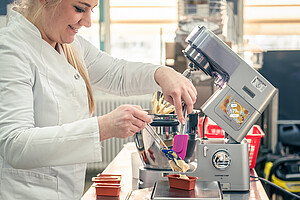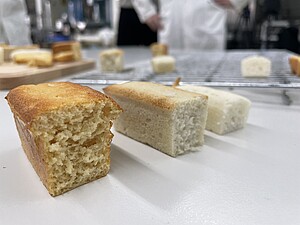Natalie Feller, a doctoral student at the Department of Plant-Based Foods at the University of Hohenheim, is currently driving a research project focusing on replacing gluten proteins with alternative proteins. These proteins come from a variety of sources, including peas, canola, rice, and corn. The goal of her research is to produce fluffy and airy baked goods that are also gluten-free. In her research, Natalie combines various disciplines such as food technology, materials science, and engineering.
Research in this area is of particular interest as gluten appears as a problematic protein in two to three percent of the population. Thus, the development of gluten-free alternatives that still retain the taste and texture of traditional baked goods could be of great benefit to a significant number of people.
Link to video (Source: Press releases from the University of Hohenheim - link)


Image left: Doctoral student Natalie Feller portions the bread dough with alternative proteins instead of gluten into mini loaf pans for the baking line, 30g at a time. | Image source: University of Hohenheim / Oliver Reuther
Image right: What gives the dough the desired airiness: Plant proteins (l.) or saponins (r.)? | Image source: University of Hohenheim / Corinna Schmid